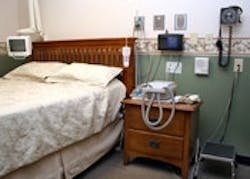Hospitals Urged to Exercise Greater Vigilance over in Summer Months to Avoid Legionella
Source Pall Corporation
A study published in the Journal of Infectious Diseases showed that summer patients who are vulnerable to infection run a greater risk of contracting Legionnaires’ disease, a severe form of pneumonia, during warm, humid weather. The infection is caused by Legionella bacteria that can live in hospital water systems and throughout the environment.
Legionella bacteria, while usually not a problem for healthy adults, can be most serious and even fatal for patients who are immune compromised, including those in intensive care units, the very young and the very old, the chronically ill, and post-surgical, cancer and transplant patients. These patients risk becoming infected through a buildup of microbes that can inhabit a hospital’s water system, where they have oftentimes become resistant to traditional methods of cleaning and disinfection.
At-risk patients can become ill through any exposure to hospital water, whether through ingestion, ice cubes, bathing, inhalation of shower mist or being treated with equipment washed in hospital water.
“Many healthcare professionals aren’t aware of what’s lurking in their water in the summer or any season, especially the water used with critically ill and at-risk patients. As a result, countless Legionella and other harmful microorganisms that can cause serious infections go undetected,” according to Janet E. Stout, Ph.D., an international expert on Legionella and other microbes in hospital water. Stout, director of the Special Pathogens Laboratory and a microbiologist at the University of Pittsburgh, is a strong advocate for reducing the risk of waterborne infection in hospitals, nursing homes and other healthcare facilities.
Patients, their families and caregivers need to be aware of the potential for waterborne infection any time they are hospitalized, particularly if they are seriously ill or undergoing treatment that affects their immune systems, according to Stout.
Hospital infections affect two million people in hospitals and nursing homes each year, adding $30.5 billion annually to the nation’s health tab. This year more than 100,000 people will die from these infections, the fourth leading cause of death in the U.S., according to the Committee to Reduce Infection Deaths.
18,000 cases of Legionnaires’ disease are reported in the U.S. each year, and nearly 40,000 lives are known to have been lost to the disease over the past two dozen years as a result of infections acquired in the hospital, with thousands more cases thought to go undetected or misdiagnosed.
Here is a list of things to think about when staying in a hospital to avoid being at risk:
- Check hospital’s infection rates and find out how it compares to others in the region. The issue is timely because a growing number of states, including New York and California, are enacting legislation to make hospital infection rates public.
- Ask the hospital if it tests its water system for Legionella, common waterborne microorganisms that cause disease and other sources of infection
- Find out if the hospital has a waterborne pathogen prevention plan and whether any water treatment measures are used, such as chemical treatment or filters (point-of-use filtration) on faucets, showerheads and ice machines to reduce your risk of exposure to waterborne microbes.
- Transplant patients and other high-risk patients can reduce the risk of Legionella and other disease-causing germs in the water by using filtered or bottled water.
- If the hospital care unit does not have a prevention plan or point-of-use filters for faucets, showers and ice machines, avoid exposure to non-sterile or untreated tap water. Typical tap water exposures include sucking on ice, drinking water, bathing, showering and use of medical equipment that has been rinsed in hospital tap water.
- Boiling water for drinking has been recommended for immunocompromised patients after discharge.
Source: Pall Corporation
